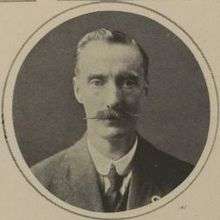Robert Barrie Walker

Robert Barrie Walker (1878–1961) was a British trade unionist.
Born in Lanarkshire to a family of farm workers, Walker initially worked on the railways, before moving to England. He enlisted in the British Army and served in the Second Boer War. When demobbed, he became involved in trade union organising in the English Midlands, for National Union of Agricultural Workers (NUAW), soon moving to join its head office, in Fakenham.[1]
Active in the Labour Party, Walker stood unsuccessfully in King's Lynn at the 1918 and 1922 general elections, then at Ormskirk in 1923 and 1924.[1] He was asked to stand at the Ludlow by-election, 1923, but declined, correctly judging that the party had little support in the area.[2]
Walker was elected as general secretary of the NUAW in 1912[1] and pursued a radical, socialist programme.[3] In 1918, he moved the union's headquarters from Fakenham to London in an attempt to broaden its national appeal, but this initially had little success, and removed him from direct influence in the union's activities in the county.[4] He achieved a national profile with the Trades Union Congress, being elected to its Parliamentary Committee in 1917, then serving as president in 1921–22.[1][5]
In 1928, Walker stood down as general secretary of the NUAW in controversial circumstances.[1] Although the union officially stated that he had retired on age grounds,[3] it was hinted that he had been forced out on ground of financial impropriety.[6] He subsequently emigrated to Australia.[1]
References
- 1 2 3 4 5 6 Claire Griffiths, Labour and the Countryside: The Politics of Rural Britain 1918-1939
- ↑ Stuart Ball and Ian Holliday, Mass Conservatism, p. 40
- 1 2 Bob Wynn, Skilled at all trades: the history of the farmworkers' union, 1947-1984, p. 72
- ↑ Howard Newby, The deferential farm worker: a study of farm workers in Norfolk, p. 221
- ↑ "Details of Past Congresses Archived 2013-10-04 at the Wayback Machine.", Trades Union Congress
- ↑ Claire Griffiths, Labour and the Countryside: The Politics of Rural Britain 1918-1939, p. 205
| Trade union offices | ||
|---|---|---|
| Preceded by George Edwards |
General Secretary of the National Union of Agricultural Workers 1912–1928 |
Succeeded by Bill Holmes |
| Preceded by New position |
Agriculture Group representative on the General Council of the TUC 1921–1928 |
Succeeded by Bill Holmes |
| Preceded by Edward L. Poulton |
President of the Trades Union Congress 1922 |
Succeeded by Joe Williams |
| Preceded by Edward L. Poulton and Herbert Smith |
Trades Union Congress representative to the American Federation of Labour 1923 With: William C. Robinson |
Succeeded by Charlie Cramp and Alonzo Swales |